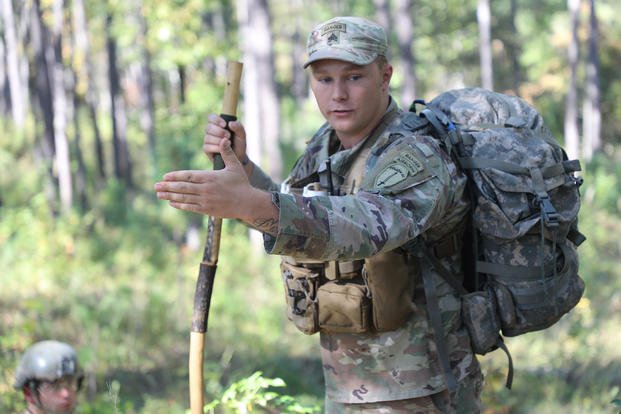Ever wanted to put on the Ranger Tab on your Army uniform? As with any of the Special Operations units in the U.S. military, to become a Ranger takes endurance, stamina, intelligence and mental toughness.
The training is broken up into three phases: the Fort Moore (formerly known as Fort Benning) Phase, Mountain Phase and Florida Phase.
The Benning Phase is executed in two parts and lasts for a total of 20 days. As with most Special Operations units, the first phase is very physical.
From the Ranger Training Brigade webpage:
Fort Moore Phase
"The Initial Phase is conducted in two parts; the first part, Ranger Assessment Phase (RAP), is conducted at Camp Rogers in the Harmony Church area of Fort Moore. This phase consists of a Ranger physical fitness test that requires 49 push-ups, 59 sit-ups, an individual five-mile release run event finished in 40 minutes or less and six chin-ups.
Other physical requirements and tests:
Combat water survival test
Darby mile run event
Five-mile runs
Terrain runs with the Malvesti obstacle course
12-mile foot march
Night and day land navigation tests
Advanced physical training assures physical and mental endurance and the stamina required for obtaining basic Ranger characteristics; commitment, confidence and physical and mental toughness. Additionally, the student executes demolitions training and airborne refresher training. Airborne soldiers will exit from a high performance aircraft and conduct tactical assembly area procedures."
Find Available Special Operations Opportunities
To be competitive in any of these physical tests, the future Ranger students must not strive for the minimum standards above but must maximize their personal physical effort and strive for the following:
Push-ups 80-100
Sit-ups 80-100
Chin-ups 15-20
2-mile run: under 13:00
However, the most important pre-training exercise to do before Ranger school is walking fast in your boots with 50 pounds of weight on your back. You will do this every day you are at Ranger School. Running at least five miles 3-4 times a week and swimming in uniform 2-3 times a week is recommended as well. Pack on 5-10 pounds of body weight before going so you have a little to lose when you are consuming fewer calories a day.
The second part of First Phase has obstacle courses and long ruck marches as a major part of the physical fitness requirements. However, the fundamentals of patrolling and small unit tactics are the focus of this part of the Moore Phase. These graded field exercises include ambush and reconnaissance patrols, close quarters combat, airborne operations and air assault operations. The Ranger student then must demonstrate his expertise through a series of cadre and student-led tactical patrol operations.
Mountain Phase
The second phase, or Mountain Phase, lasts 20 days and nights and teaches students to operate in small units while sustaining themselves and their subordinates in the adverse conditions of the mountains. The rugged terrain, hunger and sleep deprivation are the biggest causes of emotional stress that students encounter. Students will eat, sleep and operate in these conditions for three weeks, usually eating no more than one or two MREs a day (Meals Ready to Eat).
Florida Phase
The third phase, or Florida Phase, teaches small boat operations, ship-to-shore operations, stream-crossing techniques and skills needed to survive and operate in a jungle and swamp environment. This phase lasts 16 days and nights and tests the patrolling and leadership techniques of every Ranger.
Learn More About Army Special Forces
Ranger School is grueling due to the long hours of walking with your gear, sleeping in the field and eating one or two meals less a day than normal. Many students lose 20-30 pounds in the 56-day school. But the school teaches the Ranger he can overcome insurmountable challenges while under simulated combat conditions. Ranger School has honed the professional skills and techniques necessary to conduct small unit operations. And of course, he can wear the well-deserved Ranger Tab on his shoulder.
More Army Special Forces articles:
All Army Special Forces articles
Stew Smith is a former Navy SEAL and fitness author certified as a Strength and Conditioning Specialist (CSCS) with the National Strength and Conditioning Association. Visit his Fitness eBook store if you’re looking to start a workout program to create a healthy lifestyle. Send your fitness questions to stew@stewsmith.com.
Want to Learn More About Military Life?
Whether you're thinking of joining the military, looking for fitness and basic training tips, or keeping up with military life and benefits, Military.com has you covered. Subscribe to Military.com to have military news, updates and resources delivered directly to your inbox.



















